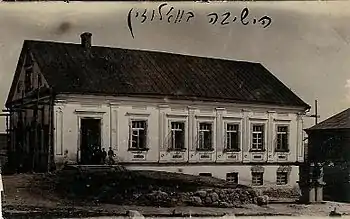Yitzhak of Volozhin
Yitzhak of Volozhin (also known as Rabbi Yitzhak ben Chaim of Volozhin, Rabbi Itsele Volozhiner, and HagRIts; 1780–1849) was a rosh yeshiva of the Volozhin Yeshiva.
HagRIts Yitzhak ben Chaim of Volozhin | |
|---|---|
| Title | Rabbi |
| Personal | |
| Born | 1780 |
| Died | 16 June 1849 (aged 68–69) |
| Religion | Judaism |
| Parents |
|
| Denomination | Orthodox Judaism |
| Position | Rosh yeshiva |
| Yeshiva | Volozhin Yeshiva |
Biography
Yitzhak was born in 1780 in Volozhin, Polish–Lithuanian Commonwealth to rabbi Chaim of Volozhin.[1][2][3] As Rosh Yeshiva, his father taught him in the Volozhin Yeshiva.[1]
Yitzhak would later become a teacher there during his father's lifetime and inherit the position of Rosh Yeshiva after his father's death.[4][5] He would earn the acronym HagRIts, Hagaon Rabbi Itskhak, according to rabbi Baruch Epstein.[1][6] He would continue to operate the yeshiva after it was officially closed by government authorities in 1824, making a name for himself as a misnaged figure.[7][8]

In 1843 Yitzhak would attend a government convened conference on Jewish education and defend the Orthodox position.[9][10] He argued that public school would be a danger to Jewish upbringing and that the Jewish people needed more political rights.[7]
Yitzhak died on June 16, 1849 in Ivenets.[7][10] Rabbi Eliezer Fried, the husband of one of his daughters, would succeed Yitzhak as Rosh Yeshiva.[4][11] Rabbi Naftali Zvi Yehuda Berlin, a second son in law of Yitzhak, would succeed Rabbi Fried.[12]
References
- Frishman Gabbay, Anita (1970). "Rabbi Itsele Volozhiner – Hagaon Rabbi Itskhok ("Hagrits"): R' Itsele, his personality, cleverness and sharpness". In Leoni, E. (ed.). Wolozyn; sefer shel ha-ir-shel yeshivat "Ets Hayim" [Wolozin; the Book of the City and of the Etz Hayyim Yeshiva]. Translated by Porat, Moshe. Tel-Aviv. pp. 99–102. Retrieved 2020-12-02.
- Brown, Benjamin (March 2020). "The Comeback of "Simple Faith": The Ultra-Orthodox Concept of Faith and Its Development in the Nineteenth Century". www.researchgate.net. Hebrew University of Jerusalem. Retrieved 2020-12-02.
- Rosman, Dovid. Torah connections : reaching your potential through the Parashah. [Jerusalem]. ISBN 978-1-68025-045-9. OCLC 962758166.
- Assaf, David (2008-04-09). Journey to a Nineteenth-Century Shtetl: The Memoirs of Yekhezkel Kotik. Wayne State University Press. ISBN 978-0-8143-3733-2.
- Ferziger, Adam S. (1999). "The Lookstein Legacy: An American Orthodox Rabbinical Dynasty?". Jewish History. 13 (1): 127–149. ISSN 0334-701X.
- Epstein, Baruch. Mekor Baruch.
- Редакция. "Воложинер Хаим бен Ицхак". Электронная еврейская энциклопедия ОРТ (in Russian). Retrieved 2020-12-02.
- Schneersohn, Shalom Dov Baer (1969). Kuntres Umaʻayon Mibais HaShem. Kehot Publication Society.
- Etkes, I. (1993). Rabbi Israel Salanter and the Mussar Movement: Seeking the Torah of Truth. Jewish Publication Society. ISBN 978-0-8276-0438-4.
- "ISAAC BEN ḤAYYIM OF VOLOZHIN - JewishEncyclopedia.com". www.jewishencyclopedia.com. 1906. Retrieved 2020-12-03.
- Leibowitz, Nehama (1976). Studies in Bereshit (Genesis): In the Context of Ancient and Modern Jewish Bible Commentary. World Zionist Organization, Department for Torah Education and Culture.
- Frankel, Jonathan. Jews and Gender: The Challenge to Hierarchy. Oxford University Press.